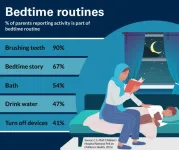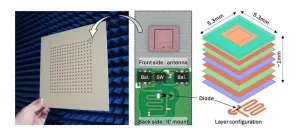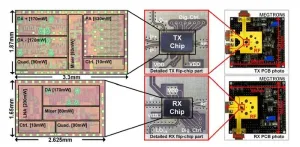(Press-News.org)
A pioneering study published today in the journal Nature Aging has unveiled significant heterogeneity in the risk factors affecting healthy aging in Latin America and emphasised the limitations of current models of brain health, which are primarily based on data from high-income countries. The research was conducted by researchers from Trinity College Dublin (Ireland), and by colleagues in Universidad Adolfo Ibanez (Chile) and Pontificia Universidad Javeriana (Colombia) among others.
The study developed a metanalytical approach with 146,000 participants and findings emphasise how current models of brain health may not apply to the diverse populations of Latin America.
Towards tailored and personalised models of healthy aging and brain health
Latin America faces unique challenges in promoting healthy brain aging, including genetic admixture (shaping genetic variation and disease risk), adverse childhood experiences, socioeconomic inequities, and health disparities. Both physical and social exposomes significantly influence brain health, differing from the patterns observed in high-income countries.
The study involved a comprehensive meta-analysis of multiple studies, ultimately including over 146,000 participants. Results highlighted significant but heterogeneous effects on cognition and functional ability, with varied impacts from demographics, mental health, health status, and social determinants.
This study revealed substantial variability in how risk factors impact cognition and functional ability across Latin American populations. This variability underscores the inadequacy of one-size-fits-all models developed from high-income countries. High heterogeneity, outliers, variations between countries, and lack of robust computational approaches have affected the reliability of existing data.
Toward a better science of healthy aging and brain health
Agustin Ibanez, first author of the study, Atlantic Fellow at the Global Brain Health Institute, Trinity College Dublin and Director of BrainLat UAI,.said:
“The study confirmed an emerging idea that global models of brain health, predominantly based on data from high-income countries, may not be universally applicable. Our work shows significant heterogeneity in risk factors affecting cognition and functional ability across Latin American populations, highlighting the inadequacy of current models based on data from high-income countries.”
There is an urgent need for comprehensive and harmonised data collection efforts to capture the diverse factors influencing healthy aging in Latin America.
Carlos Coronel, Atlantic Fellow at the Global Brain Health Institute, Trinity College Dublin, co-authorsaid:
“Developing predictive models tailored to the region's unique demographic, genetic, and socioeconomic contexts is essential. Bridging this gap requires advanced computational approaches that integrate theories of brain function and its interaction with the exposome.”
The study recommends implementing robust methodological approaches, promoting data-driven and machine-learning techniques, and focusing on social determinants of health and other socioeconomic disparities. On those social factors,
Commenting on those social factors, Joaquin Migeot, co-author and postdoctoral researcher at BrainLat, said:
"The need to address the aggregated effect of various exposures throughout life entails a high dimensionality of variables. To manage this complexity and derive meaningful conclusions, the use of machine learning techniques is essential to facilitating a more comprehensive and accurate understanding of how multiple exposures impact brain health. These efforts will inform tailored policy and healthcare interventions, improving brain health and aging outcomes in Latin America.”
Sandra Baez, co-author and professor at Los Andes University (Colombia) and Atlantic Fellow at the Global Brain Health Institute, Trinity College Dublin, said:,
“This study is a significant step towards understanding the unique factors that impact aging and brain health in Latin America. Our findings advocate for a more nuanced and region-specific approach to developing brain health models tailored to diverse and underrepresented populations.”
END
A new thesis at Uppsala University questions the traditional view of stress-induced exhaustion disorder. A new model is proposed in its place that puts more focus on meaningfulness rather than recovery.
“There are no established evidence-based models for the psychological treatment of stress-induced exhaustion disorder. The concepts of ‘recovery’ and ‘stress’ are so widely accepted in our current era that it is difficult to examine them critically. It’s easy to think that patients with stress-related exhaustion should prioritise rest and relaxation, but an overly one-sided focus on recovery ...
ANN ARBOR, Mich. – Many bedtime battles stem from children’s after dark worries, suggests a new national poll.
And while most families have bedtime rituals to help their little ones ease into nighttime, many rely on strategies that may increase sleep challenges long term, according to the University of Michigan Health C.S. Mott Children’s Hospital National Poll on Children’s Health.
Overall, one in four parents describe getting their young child to bed as difficult – and these parents are less likely to have a bedtime routine, more likely to leave on a video or TV show, and more likely to stay with their child until they’re ...
A novel 256-element wirelessly powered transceiver array for non-line-of-sight 5G communication, featuring efficient wireless power transmission and high-power conversion efficiency, has been designed by scientists at Tokyo Tech. The innovative design can enhance the 5G network coverage even to places with link blockage, improving flexibility and coverage area, and potentially making high-speed, low-latency communication more accessible.
Millimeter wave 5G communication, which uses extremely high-frequency radio signals (24 to 100 GHz), is a promising technology for next-generation wireless ...
Newfound evidence reveals that the upsurge of the exotic Nile perch in Lake Victoria had long-lasting effects on the genetic diversity of various local cichlid species, report scientists from Tokyo Tech. Through large-scale comparative genomic analyses, the researchers found concrete proof in the collective genome of multiple species that this artificially introduced perch decimated many local fish populations, causing a 'bottleneck effect.'
The careless introduction of exotic species by humans into ecosystems can lead to truly catastrophic results, as has been ...
With wildfires becoming more frequent and extensive in Canada, it’s important for people to understand the health risks of wildfire smoke. An article in CMAJ (Canadian Medical Association Journal) https://www.cmaj.ca/lookup/doi/10.1503/cmaj.240135 aims to provide information for clinicians and people in Canada as wildfire season is upon us.
"As climate change causes more frequent and severe wildfires, wildfire smoke becomes a larger health problem,” says Dr. Mehdi Aloosh, assistant professor, Health Research Methods, Evidence, and Impact, McMaster University, Hamilton, and medical officer of health of Windsor–Essex County, Ontario. “Communities need ...
Children across the United States who identify as LGBTQ+ say the sexual health education curricula they receive is leaving them without essential information to make informed decisions about their sexual health – which could force them to seek potentially dangerous advice elsewhere.
The results of a new, national, peer-reviewed survey, show that these young people — aged 13 to 17 — believe crucial topics surrounding sexual orientation and gender identity are being omitted from sexual health education programs.
Experts who led the study – published today in The Journal of Sex Research, as people around the ...
WASHINGTON – A rigorous, comprehensive synthesis of evidence from 62 studies related to the use of oral nicotine pouches by Georgetown University’s Lombardi Comprehensive Cancer Center scientists and colleagues provides a much-needed assessment of how these products could lead to potential harmful consequences if used by young people.
Oral nicotine pouches were first introduced in the U.S. in the past decade and are pre-portioned white granular packets containing nicotine placed between the gums and lips, marketed as tobacco-free, and are sold in various flavors and nicotine strengths.
The findings appeared ...
A recently developed wirelessly powered 5G relay could accelerate the development of smart factories, report scientists from Tokyo Tech. By adopting a lower operating frequency for wireless power transfer, the proposed relay design solves many of the current limitations, including range and efficiency. In turn, this allows for a more versatile and widespread arrangement of sensors and transceivers in industrial settings.
One of the hallmarks of the Information Age is the transformation of industries towards a greater flow of ...
A new D-band CMOS transceiver chipset with 56 GHz signal-chain bandwidth achieves the highest transmission speed of 640 Gbps for a wireless device realized with integrated circuits, as reported by researchers from Tokyo Tech and National Institute of Information and Communications Technology. The proposed chipset is highly promising for the next generation of wireless systems.
To achieve faster speeds and handle increasing data traffic, wireless systems are operating in higher millimeter-wave frequency bands. Current high-band 5G systems offer speeds as high as 10 Gbps and operate in frequency bands between 24–47 GHz. The next generation ...
Peer-reviewed – Qualitative study - Humans
A new study has provided an in-depth look into the rising trend of disposable vape use among young people in the UK.
The research, led by the University of East Anglia, reveals that young people see smoking and vaping as interchangeable, but are far more aware of the potential harms of vaping than they are of the dangers of smoking.
The findings also suggest that banning disposable vape products or increasing their prices could lead young people to revert to smoking tobacco.
Many of the young people questioned also believed that ...





